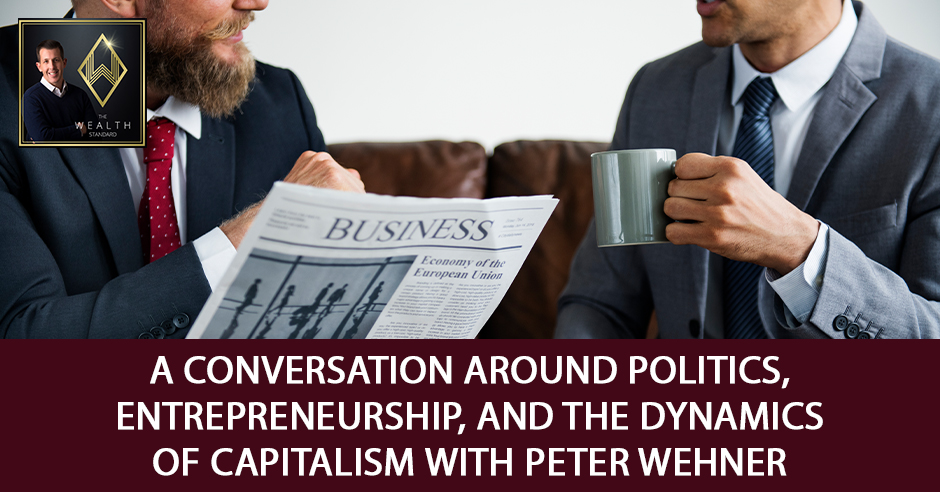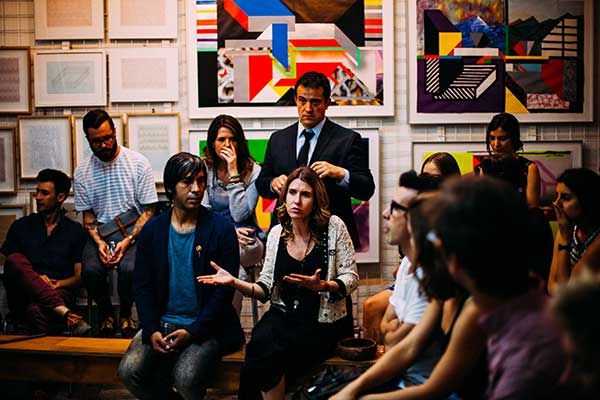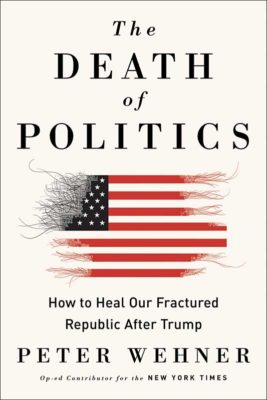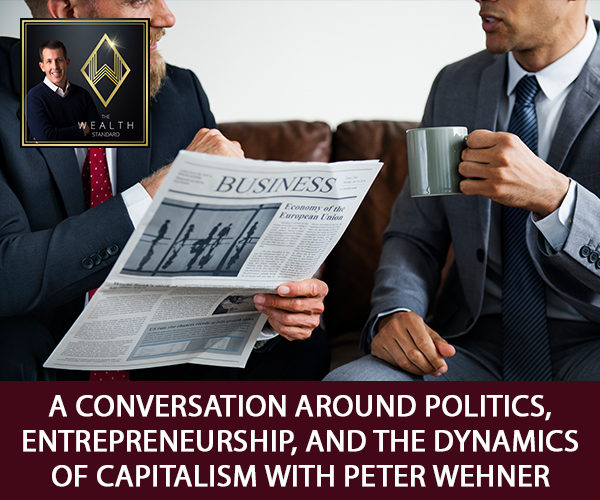A Conversation Around Politics, Entrepreneurship, And The Dynamics Of Capitalism with Peter Wehner
Podcast: Play in new window | Download

Capitalism is the greatest economic system in human history because it’s lifted more people out of poverty than any system in human history and allowed for the conditions for great human flourishing and great technological advancements. This is according to Peter Wehner, a New York Times contributing Op-Ed writer covering American politics and conservative thought and a popular media commentator on politics. Wehner is also a veteran of three White House administrations and author of the books Wealth and Justice, The Morality of Democratic Capitalism, and The Death of Politics. In this episode, he dives into the aspects and dynamics of capitalism.
—
Watch the episode here:
Listen to the podcast here:
A Conversation Around Politics, Entrepreneurship, And The Dynamics Of Capitalism with Peter Wehner
My guest is incredible. Probably the best top three interviews I’ve had. We are talking about entrepreneurship, but we also weave in capitalism. We talk about a lot of what the theme was in 2018, life, liberty and property. It was awesome to talk to this individual. He is super intelligent and very distinguished. Peter Wehner is my guest and he is a Senior Fellow at the Ethics and Public Policy Center. He also is a contributing editor at the Atlantic Magazine. He is also a contributing columnist for the New York Times. He is the former Director of the White House Office of Strategic Initiatives and Senior Advisor to President George W. Bush. He has authored a few books, Wealth and Justice: The Morality of Democratic Capitalism and The Death of Politics. Welcome, Peter. It is amazing to have you on. I’m excited about this conversation and to talk to you about your book as well as some of the things that you’ve been preaching.
Thanks for having me on. It’s a pleasure to be with you.
I talked to you a little bit about what we’ve been doing, which is focusing on the topics that include life, liberty, property from some of John Locke’s writings. As well as what capitalism is, entrepreneurship, and the framework where most people want to be a part of. Not necessarily just in the US but around the world. I look at what you’ve written about and understood it for quite some time studying and looking at where our society is and what has made us successful versus other nations perhaps. How have you come to understand capitalism in general and the aspects and dynamics of capitalism?
My belief is that capitalism is the greatest economic system in human history because it has lifted more people out of poverty than any system in human history and allowed for the conditions for great human flourishing and great technological advancements. Capitalism unmitigated and unrestrained has some problems. Part of what democracies and free societies have to do is to soften some of the rougher edges of that. That’s a prudential judgment. What does that mean? What programs have to be done to do that? You have to weigh the costs and benefits in terms of the effects on economic growth and all the rest.
It’s my belief that capitalism works because it’s most consistent with human nature. I’m a big believer in the idea that you have to confirm your economic and political systems to certain realities about human nature. I think capitalism accords to that and aligns with that. It understands as Adam Smith talked about what selfishness rightly understood is. You have to take into account what drives and motivates people that you can’t believe simply altruism, even though altruism is a part of human life and human experience. People act in ways that advance their self-interest rightly understood. You have to create certain incentives that will lead human beings to act in the ways that are both expected of them but also advances the common good.
I think the American understanding of capitalism, by and large, is the right one. Limited government entrepreneurship, free markets, skepticism about the ability of the centralized government to dictate decisions and believe that it has the capacity to anticipate and direct all aspects of human life. It has improved and right. There’s an epistemological modesty that capitalism understands, which is that you can’t get a small group of very bright people who can run economies. The way that economies work best is letting people by and large to be free to act in ways that want to act.
Let me go into two things that you had said because I find this interesting. It sounds like there’s this altruistic pull of human beings to be charitable to help others, to contribute, give back. There’s also this invisible hand, maybe more self-interested. It seems like those two things are pulling against each other. Are they mutually exclusive or is it may be a mischaracterization of those two concepts?
I don’t think of them as mutually exclusive. I think that they can be complementary. They’re distinct and they’re part of human nature. Think about your own life, the lives of your friends and your family, you probably see both of those elements in them. There are times in which you see altruism, self-sacrifice, selflessness, acts of charity, sympathy and compassion. Those things are real and they exist. They should be encouraged where they can. On the other hand, all of us act in our self-interest as well. That’s the way we’re designed. That’s the way that we operate. Most of life is acting in our self-interest provided that it doesn’t run over the rights of other people, and none of us are completely selfless, self-giving, completely compassionate and completely sympathetic. You have to take that into account.
The way that economies work best is by letting people be free to act in ways that they want to act. Click To TweetThat’s not a bad thing as long as it’s channeled in the right way. The trick here is to try and take those human realities and direct them in a way that advances the common good. The founders understood this. Their view of human nature was correct, which is that people are capable of virtue and nobility but also acts of recklessness, irresponsibility and evil. You have to take both of those things into account. My own sense, I’m a person of the Christian faith. The Christian understanding of human nature is essentially correct. It’s that too, which is the advice and virtue are intermingled in people’s lives and in people’s hearts. It’s a complicated mix. People in different seasons in life lean in more of one direction than another. The challenge in individual lives, as well as a society, is to try and emphasize, give force and power to the higher things and to mitigate the lower things.
I do want to hit on a few of the things you said. Go to this idea of central powers dictating what people should do or taking care of them is the banner sometimes in which central governances is looked to as a virtue. What is it about that structure that people don’t end up liking? The ideal side of things that they push through or talk about sometimes is intriguing. I see why they would appeal to people, but when it comes down to it, why do people kick against that? Why does that impede human progress or does it?
Let’s take facts and circumstances. Sometimes when the centralized government, the national government who’s acted is advanced, great good, and sometimes, often it’s done the opposite. I’m somebody who believes in limited government and is wary of centralized government. I’m a lifelong conservative. That’s what’s shaped my beliefs in part because the way I understand conservatism is that it’s based very much on the human experience. It’s a negation of ideology, Russell Kirk and others have said. You have to take into account what works for the human condition. I’d say that there are several reasons for it in terms of why one is skeptical with centralized power. One is simply on the efficacy standpoint. Peter Schuck wrote a book about why government fails. He refers to himself in the book as a militant moderate.
He’s not an ideological person, but he’s an empirical look at what it is about a large government that doesn’t work very often, that fails where the efficiency is not what it ought to be. Anybody who’s worked there, if they’re honest, would concede that fact. How often these grand promises and hopes that are sincere and don’t translate into reality. I think you could look at much of the great society and see that. Even programs which have done some good but have also are themselves extremely inefficient like Medicare and Medicaid. I wouldn’t argue that no good comes out of them. I don’t think that’s sustainable, but those programs are not nearly as efficient as they could be.

Dynamics Of Capitalism: Most of life is acting in our self-interest provided that it doesn’t run over the rights of other people.
I’d say the inefficiency and lack of efficacy for centralized government is something that we need to be alert to. There’s the concern that the founders themselves had and many others who had, which is when you centralize power, there’s the danger of authoritarianism and even totalitarianism. That as the old maximum goes, power corrupts and absolute power corrupts. We’ve seen time after time that when people get a tremendous amount of power, when it’s unchecked and it’s on challenged, that can lead to some very bad conditions and situations. That was the worry of the founders. That’s the reason that they set up our system of government of checks, balances, and separation of powers because what they wanted was not an efficient government. They wanted a government that protected against tyranny.
I think that’s a second reason that people need to be wary about centralized government. The third reason is that if you go back and you read Adam Smith in a certain way and probably more specifically this idea about which is that there’s this mythology among Progressives, which is that if you get a group of wise men, wise women, they can oversee, conduct, and determine how human society can act and all realms that simply isn’t possible. They can’t do it. There are so many imponderables in lives, so many contingencies in life that the idea that a centralized state or a group of individuals would be able to make those judgments. I just don’t think works.
The fourth thing I’d say is George Will, a marvelous book that he wrote called The Conservative Sensibility writes about the American founding. He says, “That’s essentially what conservative’s need to conserve.” which is the idea of inalienable rights. Natural rights, rights that precede government. His argument and I think it’s a valid point that government, if it gets too large, too centralized, can undermine those natural rights. He makes the case in a pretty persuasive way that the belief in natural rights would tend to lead one toward a more limited government.
Let’s go to your book because you look at the idea of capitalism and just the word itself formulates a specific reaction in people as far as my experience is concerned. It’s not necessarily based on logic and thought through education debate where a person comes to an understanding. It’s more based on what has been heard. What society believes about that word? Talk about your best-selling book, Wealth and Justice: The Morality of Democratic Capitalism and weave that into the conversation. Talking about how that can essentially be a message that will hit on the principles that make capitalism good for society as opposed to what most people react to, which is that it exploits people and takes advantage of people. It’s all about the wealthy and them getting their own.
People are capable of virtue and nobility, but also acts of recklessness, irresponsibility, and evil. Click To TweetI coauthor it. It’s a monograph of the American Enterprise Institute with Arthur Brooks, who was for many years President of an American Enterprise Institute. He left to take a professorship at Harvard. Arthur is very good in a very sober and thoughtful voice on this thing. We wrote this book and the situation is more acute than it was when we wrote it. One of our concerns was Americans in general and particularly young Americans were losing faith in capitalism as a system. We see that in polls, and you’re probably more familiar with them than I am. The support for socialism is higher than at any time in my lifetime, probably higher than at any point since the early part of the twentieth century.
You see this in contemporary politics with the Democratic Party who are two of the hottest political figures in democratic politics, Bernie Sanders and Alexandria Ocasio-Cortez. They’re both self-proclaimed democratic socialists. If you watch the democratic debates, you see Bernie Sanders and Elizabeth Warren essentially taking an anti-private enterprise stance. There’s almost a reflexive hostility to anything having to do with capitalism or corporations. It doesn’t mean that those certain corporations don’t deserve criticism, but it’s a reflex. You’ve seen this rise in respect and to some of the enthusiasm for socialism and the decline in competence and capitalism. That’s a problem. Some of that is undoubtedly a result of the great in 2008. I think that the income gap between the most wealthy and the rest of the society probably had more of an effect on the general public than a lot of people on the right thought that it would.
It seems to have permeated society and the belief that the very rich are making out like bandits, the rest of us are not and so much of the gains in wealth, money from the market, that has happened. We’ve had wage stagnation from pretty much the entire part of the 21st century. Wages had been much flatter and it’s a complicated set of reasons for why that’s happened. I wouldn’t blame that on any single president. Certain deep trends are in play here, which I’m guessing you’ve covered. There seems to be a lack of faith in capitalism. That’s given rise to populism, which I’m wary about as a conservative. I think populism can often be antithetical to capitalism and it can be antithetical to reason itself.
I think it first goes to reason because I would say there’s less reason. It may be the delusion of information that’s all around us and individuals who can’t fit anything else into their head. Therefore they take the efficient approach and leverage the belief system of someone they feel is like them. It’s interesting to see how society has been wired to think a certain way and it’s not necessarily the beliefs associated with reason, debate and personal individual understanding. Its group thinking dictated by very persuasive people like your AOC and Bernie Sanders.

Dynamics Of Capitalism: It’s important for the defenders of capitalism and free-market to make those arguments and not to be dismissive toward the critics.
I think that’s right. There’s a rage at the system, the establishment of healing. It’s almost a quasi-nihilism. You see this toward capitalism and the politics in general, which is this idea that we have to burn down the village to save it. Things couldn’t be worse. Let’s just toss the whole thing aside. That’s what explains in part of the rise of Donald Trump. I’ve been a very strong and persistent critic of Donald Trump in large part on conservative grounds. What he tapped into is a sense that people wanted a wrecking ball to come in and shatter things. That’s deeply anti-conservative impulse, but he tapped into it effectively.
I’ve told friends of mine who were pro-capitalism and pro-free-market as I am. It is important to do a study or set of studies to understand what happened. What explains the loss of faith in capitalism, the rise in affinity for socialism. Both attitudes and specific episodes and incidents that explain it to understand in a thoughtful way what is driving it. What are the attitudes? What is associated with free-market and capitalism and to think through how do we tell the story? What’s the narrative? What’s the tale we have to tell to remind people why capitalism is a system that has brought so much human flourishing and then so much to encourage human dignity?
I think it was Orwell who said that the first duty of a responsible man is a restatement of the obvious. Sometimes you have to restate what’s obvious or what you thought was obvious. I’ve noticed this in life, in politics, and in economics and all sorts of realms, which is sometimes people forget to make the arguments in some fundamental way. Why is it that we believe what we believe? That’s understandable. You think that certain victories are one, that arguments are settled and you just act on that assumption. Sometimes without quite realizing it, the floor breaks and all of a sudden, that confidence that people had or that understanding those shared assumptions are gone.
I think when it comes to capitalism, it’s quite important for people who are defenders of capitalism and free-market to make those arguments. Not to be dismissive toward the critics, not to laugh at them, not to say these ideas are stupid. Therefore, it shouldn’t be repudiated. Don’t even engage in name-calling, just say socialist and hope that is enough. We have to do more fundamental work to make the case again, and in a sense to win the hearts of ordinary Americans. To explain to them why capitalism is an economic system worthy of their loyalty.
No matter how strong your argument is, it's never as strong as you think it is. Click To TweetLet me use some way to abstract of an example as you may use to. There is a documentary that I saw called Behind The Curve. It was essentially about this millions of people that came together stating that the world is flat. That documentary was done by a non-flat-earther. It was interesting because he took this approach and it’s a very irrational thought, but yet millions of people were gravitating toward this. It was all driven by this emotional desire that they have to fit in within a group. Usually, a group of people that don’t believe what everybody else believes. What’s fascinating to the point you just made is the individual who was doing the documentary, they interviewed astrophysicists. They were saying, “Do you know that there’s this group out there, millions of people that believe the earth is flat?”
It’s fascinating because it takes you through this psychological urge of what I think you’re speaking to because the astrophysicists in the end said that, “These people don’t know what we know, so we can’t assume that they do and make an argument from that standpoint.” You have to meet them where they’re at and why they’ve come to that conclusion. If you start to make them wrong or make them feel stupid, it’s just going to strengthen their argument. That fits within the confines of what you’ve been talking about.
That’s a very interesting observation. I’m intrigued. I like to see that documentary. That whole area does fascinate me, I must say. I don’t know if you’re familiar with the work of Jonathan Haidt, who is a marvelous moral psychologist. He used to be at the University of Virginia. He’s now at NYU. He wrote a book called The Righteous Mind. He spends a lot of time with a group called Heterodoxy, which is an effort to defend free speech on campuses against speech codes and so forth. Jonathan himself has been on an interesting journey and interesting pilgrimage. He started out as a traditional person who laughed at Progressive and is much more of a centrist. In part because of what his research has taught him. I’ve learned a lot. He’s a very intelligent, thoughtful guy and a very good guy as well.
His work on confirmation bias and motivated reasoning is outstanding. I’ve learned a lot from it and it goes to the point that you’re making. I think a lot of us believe that the positions others hold and that we hold are derived through some disinterested analysis of the facts, reasoning, and that reasoning has brought us to what we believe, free of emotion and all the rest. What we know about brain science and human nature, the more we’re looking into these things. It is so much of what we believe is a product of transrational or subrational forces. We have dispositions, tropisms, and predilections were products of our families of origin, our life experience, the people we’re around, and the communities we’re a part of.

Dynamics Of Capitalism: There is a chance to get some deeper understanding when people feel safe and when they feel heard.
That sense of fitting in with communities is extremely strong. We know from brain science that when you get information that confirms what you already believe, it’s a dopamine effect or rush. On the flip side, when there’s information that challenges certain basic assumptions, your brain puts up often a shield to block those things out. It’s genuinely uncomfortable for people to hear information that challenges them. I’d say in my own life, politics and just human relationships, that’s one area where I’ve changed. In the past when I would have differences with people, I would often write long emails, fact base, point-by-point. People who know me would think I was built to respond to some of these issues in terms of debating. Empirical evidence, premise facts to support it, conclusion.
What I’ve discovered is no matter how strong your argument is and it’s never as strong as you think it is. Let’s just assume for the sake of argument. You and I were having a debate. The case I presented against you was overwhelming by any objective standard. The odds are not only that, you wouldn’t change your position if I overwhelmed your case. You would probably, as you were indicating, dig your heels and more. It’s quite rare to shift people. I’ve seen this in theology, in the world of Christianity, in the world of politics and all sorts of world. Where there is a chance to get some deeper understanding is when people feel safe, when they feel heard. When they believe that you know their arguments and at least can state them and understand them even if you disagree with them. If there are a human connection and a human relationship, if you have in a sense standing in somebody else’s life and that will allow them to let you in and to make their case, and vice versa.
Alan Jacobs, who is a professor at Baylor used to be at Wheaton, wrote a book called How to Think. He refers to a foundation that when they conduct debates, the first thing that they require is that the people are debating. Person A states the position of person B in such a fair-minded way that person B believes that it is a fair restatement of their views and vice versa. That is the precondition before the debate goes on. If that thing happened more often, we’d get a lot further along. We know this from the social science evidence. We are as polarized as we have been since reconstruction. It’s a deeply polarized society and when that happens, people tend to go into their own camps and they shut off people who have alternative views. I think that’s happening in all realms, including in the realm that we’re talking about free-market and capitalism. That goes to the larger discussions we’re having, which is how do you make the case in a way that the people who could conceivably be open to an alternative case are.
You’re hitting on everything that has been going through my mind. What you said was brilliant. That’s where I look at just my experience and what I was trying to get to with the whole idea of central governance. People don’t like to be told what to do. There’s this fighting response to it that I think goes into what you were referring to as our unconscious or what’s built into our wiring. That right there includes a lot of when we had to survive where we don’t necessarily have to survive anymore, but yet those instincts are still there. When a person feels attacked, I would assume that it’s very similar to being attacked by the sabertooth tiger or some animal.
Human life and experience is about learning things and recalibrating new facts and conditions that arise and trying to adjust accordingly. Click To TweetThat’s where I look at AOC and I look at Donald Trump in a way, especially where in a sense they understand psychology. They’re using what people will respond to as talking points and statements. People fall prey to it all the time. I look at the psychology side of things and going to where economics is and usually, the argument for capitalism tends to be rational thinking. I look at how human beings are wired. The majority of it’s emotional. That’s where I look at the values and principles approach has something that intrigues me as opposed to labels like capitalism, Democrats, Progressives or Liberals. It’s looking at principle as opposed to labels because the labels immediately there put you in that camp or excludes you. If you’re in the camp, you’re going to believe what the camp believes and if you’re excluded, you’re not going to believe it.
Labels exist for a reason because they label something. They identify world views, but I think that the labels by and large are probably counterproductive. Once the labels are cast out, then you’re putting people in categories, they’re putting you in categories. It becomes awfully neat, tidy and untrue. It doesn’t allow for flexibility and nuance, which is what human life and experience are about. You learn things, you refine your thinking, you recalibrate, new facts, new conditions arise and you try and adjust accordingly. If you’re in these ideological boxes, it’s very hard.
I’ve had these conversations with Trump supporters because I’m a lifelong conservative and I worked in three Republican administrations and in a Republican White House. I have a lot of friends who are Republicans. I’ve been so critical of Trump. They’re puzzled or upset by it. I’ve had a lot of conversations, many of them good. Sometimes it takes an effort to make sure that the relations don’t fray. It’s been helpful for me because I’ve been able to hear their perspective and understand where they’re coming from. I must say that there are times in which one makes an empirical claim as it relates to Donald Trump that is a criticism of him. Let’s say something about that he has lied and there’s demonstrable evidence that it’s a lie. It’s been fascinating to me how it just doesn’t breakthrough.
It is as if they think that that’s the thread and the whole thing can come apart. If they can see one thing that the whole project comes apart. I’ve experienced this throughout my life in politics, particularly when you’re in the White House. Many of the issues that you confront are complicated issues. They’re very intelligent people arguing different policies and different points of view. Often the decisions are 60/40 or 65/35. It’s not 100% arguments on one side and 0% on the other. That’s part of what discretion, judgment, prudence and wisdom is in governing. It’s the ability to hear these arguments which sound potentially equally persuasive thinking through we choose the one that is most appropriate given the circumstances we’re in. What are the contingencies that we have to anticipate but are unknowable? If you’re deciding a set of policies that you want to roll out, what’s achievable politically and not? What’s the composition of Congress? You might want to push some elements of privatization of Social Security, which you could believe is the right thing to do, but maybe it’s not achievable.

The Death of Politics: How to Heal Our Frayed Republic After Trump
Maybe you have to do something ahead of that. These are all very complicated issues to take into account. Often they are choosing one set of policies over and against another one or 60/40, but then when you get into the actual discussion, those differences disappear and that weighing of pros and cons disappears. It’s as if all the arguments are on one side and not on the other. Once you settled on a position, there seems to be some reflex that we have that says, “I can’t concede a single point to the other side because if I do it, I weaken my case and I can’t possibly weaken my case.” You have people shouting, talking points at each other, talking past each other, and refusing to engage each other and saying, “That’s a valid point. I think you’re right. I just think that the other arguments on my side outweigh the good point that you’re making.” It’s all very complicated and very challenging stuff, but I think in part explains why our politics is as broken as it is.
For the readers, I love having these conversations. Hopefully, this is valuable to you. Some of the things you’re saying, it comes down to this relation to human connection. I think all people want to connect. They want to have a relationship. At the same time, there’s this instinctive protection that they have where they want to look bad. They don’t want to be wrong because what that does is it invalidates their identity to an extent, but when you break down those walls, it’s amazing what can happen. People, either value is a value or a principle is a principle or it’s not. Most people would concede to capitalistic principles if it wasn’t labeled capitalistic principles. These are principles of life in a sense. I’ll end with this and I’ll let you have the final word. There’s something I’ve thought about, which was interesting to me.
I have little kids, two teenagers and a five-year-old. We went to the Disney Aulani Resort on Oahu. When I was there, there’s this central pool section. There were these two guys that had these big earrings, big guys with these tattoos on their arms, hardcore guys. I was able to have a conversation with them. They were there with their kids. We were in this environment in which the walls were broken down and you can have that connection, yet if I went to their neighborhood and was walking down the street at night, the environment changes, walls are up and the outcome is not going to be the same. Human beings are wired in a certain way and we want certain things. They’re very similar yet because of these walls that come up and are reinforced, it’s difficult to have the connection that’s needed in order to make even more progress.
That’s a very interesting story and I think it touches on these deeper truths that we’re talking about. An awful lot of this is what you described, which is a sense of identity. That’s basic to human beings, feeling of belonging, and feeling of community. It’s pretty rare to find people who will take stands that will put them at odds with the community that’s most important to them. That explains a lot of the political tribalism, but we’ve got to find a way to try and break down these walls you’re describing. There’s some lovely verse in the New Testament about breaking down the dividing walls that exist between people. When those walls are up, it usually means that life is going to be harsher, less sympathy, more anger, more antipathy. People begin to view other folks not as individuals that you disagree with, but as enemies at the state, enemies of your cause.
We need other people with other experiences to help us see and to understand. Click To TweetWhat can quickly kick in is the dehumanization, which is if you see things differently than I am. It’s not because you’ve analyzed things wrongly and you made an intellectual error, but you’re morally defective. There must be something wrong with you. If you don’t see things the same way I do, then you don’t value the same things that I do. In fact, you’re a threat to them. We see that in contemporary politics. We know from the data that the attitudes that Republicans, Democrats, Progressives and Conservatives have toward each other. It’s much more personal than ever before. There’s a feeling that these are not just differences of policy, but they are character flaws and faults. If you feel like you’re being attacked on that fundamental level, you’re an alien, a malicious force, a malignant force, that you want to hurt me and you want to hurt everything that I know and love. When that happens, a lot of bad stuff kicks in and we’ve got to break through that. We have to deepen the understanding and sympathy that we have for one another.
In the book that I wrote, The Death of Politics: How to Heal Our Frayed Republic After Trump. I tell a story in one of the chapters about CS Lewis and Owen Barfield. CS Lewis was a great medievalist and scholar in England. He was probably the most important Christian apologist of the twentieth century. He started a literary group in England in the 1930s. He and JRR Tolkien were the mainstays of that, but there was a person named Owen Barfield who was a British philosopher and poet and somebody that Lewis knew for many years. Lewis in his book Surprised by Joy describes what he refers to as first friends and second friends. For him, it was a person named Arthur Greeves, somebody who knew since his childhood. He said, “First friends are the individuals that when you start the sentence, they’re able to complete it. They’re your alter ego. They see the world largely the same way that you do process it the same way.” We all need that. That’s part of what human community, human attachment, human relationships bring to us. Lewis described what he referred to as a second friend and that was on Barfield. He said, “The second friend is the person who’s not your alter ego, but your anti-self.”
That’s the person who describes who reads all the same books you do and draws all the wrong conclusions from those books. He has a section where he talks about these debates that he had with Barfield and they were pretty intense. They were esoteric debates, but they were about the role of imagination and reason. Lewis says that he and Barfield would go at it hammer and tong late into the night learning the power of each other’s punches almost unconsciously beginning to absorb what the other person was saying. Out of this dog fight, a community of affection grew. The punch line was that Lewis and Barfield both treasured their relationship precisely because they took all the world somewhat differently than the other. They felt that their aperture of understanding was grayer because they had each other in their life.
Barfield later said that, “When Lewis and I debated, we didn’t debate for victory, we debated for truth.” That’s just an entirely different way of approaching dialogue and conversation, which is, “Do you have something to say where I can learn?” “Can I come out of this conversation knowing something that I didn’t before? Knowing something about you, something about the nature of the world, something about the experience that helps me see things better than I would have?” That goes back to what we were talking about, which is epistemological modesty. Even if in some abstract sense you or I were 100% correct in our understanding of a particular issue, there’s still no way that we could know the full truth and reality of things on any number of issues. That’s not within our capacity. That’s why we need other people with other experiences to help us see and to understand. If we were able to take that to heart and to incorporate it in our lives and embrace it, a lot of things in life would be better than they are.
I’ll say something to that. There’s a concept and idea that I love to use, which is three sides of a coin. Most people look at coins with two sides. There’s the edge, which is the third side. The concept is heads is one opinion, tales is another opinion, but then your opinion should sit on the edge where you should evaluate. Where are the arguments? Where the perspectives are coming from and then rationally come up with your own. I tried to look at that because you’re hitting the nail on the head with a lot of stuff we’ve talked about when it comes to perspective, what truth is, how people come to truths, and then how people change and essentially go from one side of the spectrum to another. Everything you’re hitting on is fascinating. I’d love for our audience to learn about you. Would you mind talking about your book and where they can pick that up? Also, how they can follow you. I know you are contributing to The Atlantic as well as The New York Times. Maybe talk about those outlets so that the audience can follow you.
The book that I just wrote, which was published by Harper Collins is called The Death of Politics: How to Heal Our Frayed Republic After Trump. It’s an account of my life in politics. What I’ve learned, why I believe politics is important. I think it’s a low moment and a dangerous moment, but I make the case that we need to do something about it because justice matters, and politics, it’s about a lot of things. It’s got its dark undersides as all professions do. It’s finally and fundamentally about justice. The book I wrote in less than a year, but it’s the product of a lifetime in politics. People can get that on Amazon, Barnes & Noble or any of the other outlets. I’m a contributing editor for The Atlantic Magazine. I’m a contributing opinion writer for The New York Times. I’m a Senior Fellow at the Ethics and Public Policy Center. People can follow my work there. I’m on Twitter @Peter_Wehner. I write about all sorts of issues. I’ve written about capitalism, politics, faith and friendship, and then from time-to-time, I interview people for The Atlantic. I did a couple of interviews with David Brooks on his book, The Second Mountain, and then with George Will and his book, The Conservative Sensibility. For me, it’s a lovely way to earn a living, which is for me to write, think, talk to intelligent people, and try and learn along the way.
Peter, it’s been such a joy to speak with you. This has been an awesome conversation for me and I’m hoping readers got as much out of it. Thank you again for your time. Thank you for the good that you’re doing. We’ll have to connect in the future sometime.
I’d like to do it. I enjoyed the conversation a lot. Thanks. Take care.
Important Links:
- Ethics and Public Policy Center
- Wealth and Justice: The Morality of Democratic Capitalism
- The Death of Politics: How to Heal Our Frayed Republic After Trump
- The Conservative Sensibility
- The Righteous Mind
- How to Think
- Surprised by Joy
- Barnes & Noble – The Death of Politics: How to Heal Our Frayed Republic After Trump
- @Peter_Wehner – Twitter
- The Second Mountain
- www.EPPC.org
- https://Twitter.com/peter_wehner?lang=en
- https://www.Amazon.com/Death-Politics-Frayed-Republic-After/dp/0062820796/ref=tmm_hrd_swatch_0?_encoding=UTF8&qid=&sr=
About Peter Wehner
 Peter Wehner is the author of The Death of Politics. He is a New York Times contributing Op-Ed writer covering American politics and conservative thought and a popular media commentator on politics.
Peter Wehner is the author of The Death of Politics. He is a New York Times contributing Op-Ed writer covering American politics and conservative thought and a popular media commentator on politics.
Wehner is also a Senior Fellow at the Ethics and Public Policy Center and veteran of three White House administrations.
- TheWealthStandard.com
- The Wealth Standard Facebook
- Paradigm Life Instagram
- Paradigm Life Twitter
- The Wealth Standard Youtube
















